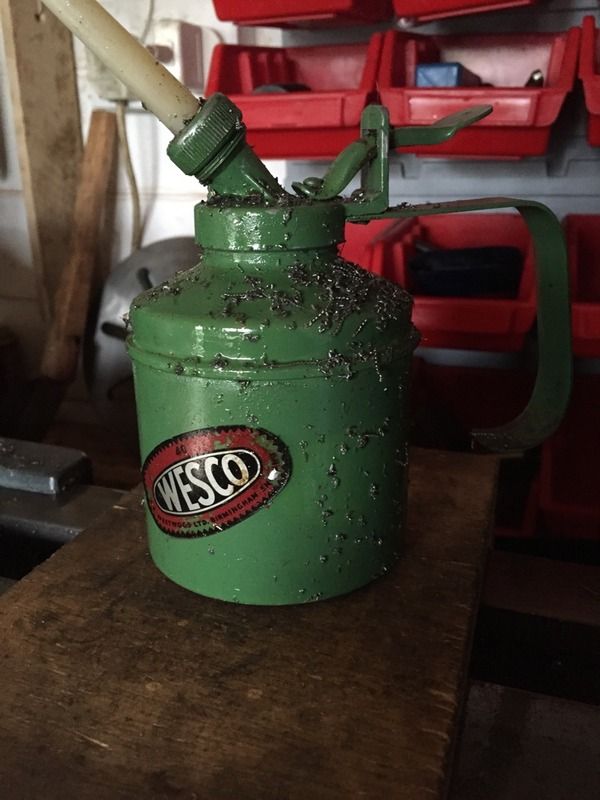Rhyolith
Established Member
Oil is an essential part of using metal hand tools and machines. I have opted for using old cans for the utilisation of this resource around my workshop, mostly just cause they look pretty  Such as the lovely one by Benton & Stone of Birmingham I recently found below:
Such as the lovely one by Benton & Stone of Birmingham I recently found below:
 Benton & Stone Oil Can by Rhyolith, on Flickr
Benton & Stone Oil Can by Rhyolith, on Flickr
I have a few queries and discussions around the subject so thought I would ask them all in one thread.
1 - I want to clean the can above of all the standard crude you tend to find in old hand tools (dry oil with dust in it), would using white spirit (which is what I usually use on drills to clean the same stuff of those) damage the valves etc... in the can's mechanism?
2 - Is there a mass purchasable alternative to 3 in 1 oil? I really like 3 in 1, but it does not appear to be possible to buy it in more than 200ml bottles... I would like to be able to have a reservoir of many litres that I can just pour into my old metal cans, ideally not in the form of 10+ small bottles. I know you can get WD40 in 5 litre bottles, but I don't consider this an alternative to 3 in 1 really (Should I?). I already have a large vat of engine oil, which I use but it is a bit too thick for most things I need.
3 - The range of different designs in Oil cans is amazing, they are obviously specialised in a lot of specific tasks (such as the singer sewing machine oilers). I would be interested to see photos of peoples favourites/best oil cans. Heres mine (at the moment; could be replaced by the one above once its cleaned up), it contains 3 in 1 and I use it on pretty much all my tools:
 Red Oiler by Rhyolith, on Flickr
Red Oiler by Rhyolith, on Flickr
 Benton & Stone Oil Can by Rhyolith, on Flickr
Benton & Stone Oil Can by Rhyolith, on FlickrI have a few queries and discussions around the subject so thought I would ask them all in one thread.
1 - I want to clean the can above of all the standard crude you tend to find in old hand tools (dry oil with dust in it), would using white spirit (which is what I usually use on drills to clean the same stuff of those) damage the valves etc... in the can's mechanism?
2 - Is there a mass purchasable alternative to 3 in 1 oil? I really like 3 in 1, but it does not appear to be possible to buy it in more than 200ml bottles... I would like to be able to have a reservoir of many litres that I can just pour into my old metal cans, ideally not in the form of 10+ small bottles. I know you can get WD40 in 5 litre bottles, but I don't consider this an alternative to 3 in 1 really (Should I?). I already have a large vat of engine oil, which I use but it is a bit too thick for most things I need.
3 - The range of different designs in Oil cans is amazing, they are obviously specialised in a lot of specific tasks (such as the singer sewing machine oilers). I would be interested to see photos of peoples favourites/best oil cans. Heres mine (at the moment; could be replaced by the one above once its cleaned up), it contains 3 in 1 and I use it on pretty much all my tools:
 Red Oiler by Rhyolith, on Flickr
Red Oiler by Rhyolith, on Flickr
































